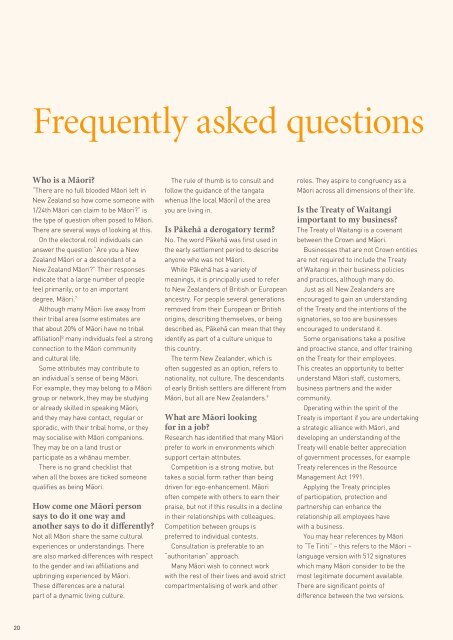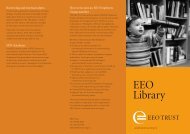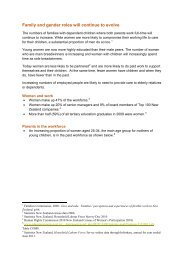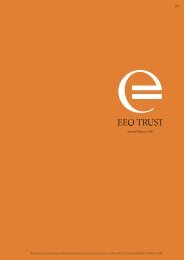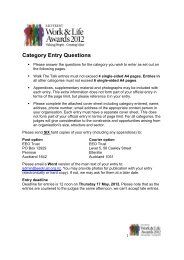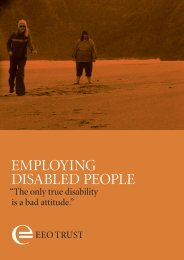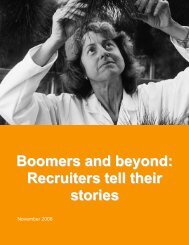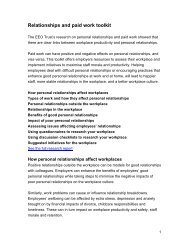Making a Difference - Equal Employment Opportunities Trust
Making a Difference - Equal Employment Opportunities Trust
Making a Difference - Equal Employment Opportunities Trust
- No tags were found...
Create successful ePaper yourself
Turn your PDF publications into a flip-book with our unique Google optimized e-Paper software.
Frequently asked questionsWho is a Māori?“There are no full blooded Māori left inNew Zealand so how come someone with1/24th Māori can claim to be Māori?” isthe type of question often posed to Māori.There are several ways of looking at this.On the electoral roll individuals cananswer the question “Are you a NewZealand Māori or a descendant of aNew Zealand Māori?” Their responsesindicate that a large number of peoplefeel primarily, or to an importantdegree, Māori. 7Although many Māori live away fromtheir tribal area (some estimates arethat about 20% of Māori have no tribalaffiliation) 8 many individuals feel a strongconnection to the Māori communityand cultural life.Some attributes may contribute toan individual’s sense of being Māori.For example, they may belong to a Māorigroup or network, they may be studyingor already skilled in speaking Māori,and they may have contact, regular orsporadic, with their tribal home, or theymay socialise with Māori companions.They may be on a land trust orparticipate as a whānau member.There is no grand checklist thatwhen all the boxes are ticked someonequalifies as being Māori.How come one Māori personsays to do it one way andanother says to do it differently?Not all Māori share the same culturalexperiences or understandings. Thereare also marked differences with respectto the gender and iwi affiliations andupbringing experienced by Māori.These differences are a naturalpart of a dynamic living culture.The rule of thumb is to consult andfollow the guidance of the tangatawhenua (the local Māori) of the areayou are living in.Is Pākehā a derogatory term?No. The word Pākehā was first used inthe early settlement period to describeanyone who was not Māori.While Pākehā has a variety ofmeanings, it is principally used to referto New Zealanders of British or Europeanancestry. For people several generationsremoved from their European or Britishorigins, describing themselves, or beingdescribed as, Pākehā can mean that theyidentify as part of a culture unique tothis country.The term New Zealander, which isoften suggested as an option, refers tonationality, not culture. The descendantsof early British settlers are different fromMāori, but all are New Zealanders. 9What are Māori lookingfor in a job?Research has identified that many Māoriprefer to work in environments whichsupport certain attributes.Competition is a strong motive, buttakes a social form rather than beingdriven for ego-enhancement. Māorioften compete with others to earn theirpraise, but not if this results in a declinein their relationships with colleagues.Competition between groups ispreferred to individual contests.Consultation is preferable to an“authoritarian” approach.Many Māori wish to connect workwith the rest of their lives and avoid strictcompartmentalising of work and otherroles. They aspire to congruency as aMāori across all dimensions of their life.Is the Treaty of Waitangiimportant to my business?The Treaty of Waitangi is a covenantbetween the Crown and Māori.Businesses that are not Crown entitiesare not required to include the Treatyof Waitangi in their business policiesand practices, although many do.Just as all New Zealanders areencouraged to gain an understandingof the Treaty and the intentions of thesignatories, so too are businessesencouraged to understand it.Some organisations take a positiveand proactive stance, and offer trainingon the Treaty for their employees.This creates an opportunity to betterunderstand Māori staff, customers,business partners and the widercommunity.Operating within the spirit of theTreaty is important if you are undertakinga strategic alliance with Māori, anddeveloping an understanding of theTreaty will enable better appreciationof government processes, for exampleTreaty references in the ResourceManagement Act 1991.Applying the Treaty principlesof participation, protection andpartnership can enhance therelationship all employees havewith a business.You may hear references by Māorito “Te Tiriti” – this refers to the Māori –language version with 512 signatureswhich many Māori consider to be themost legitimate document available.There are significant points ofdifference between the two versions.20


